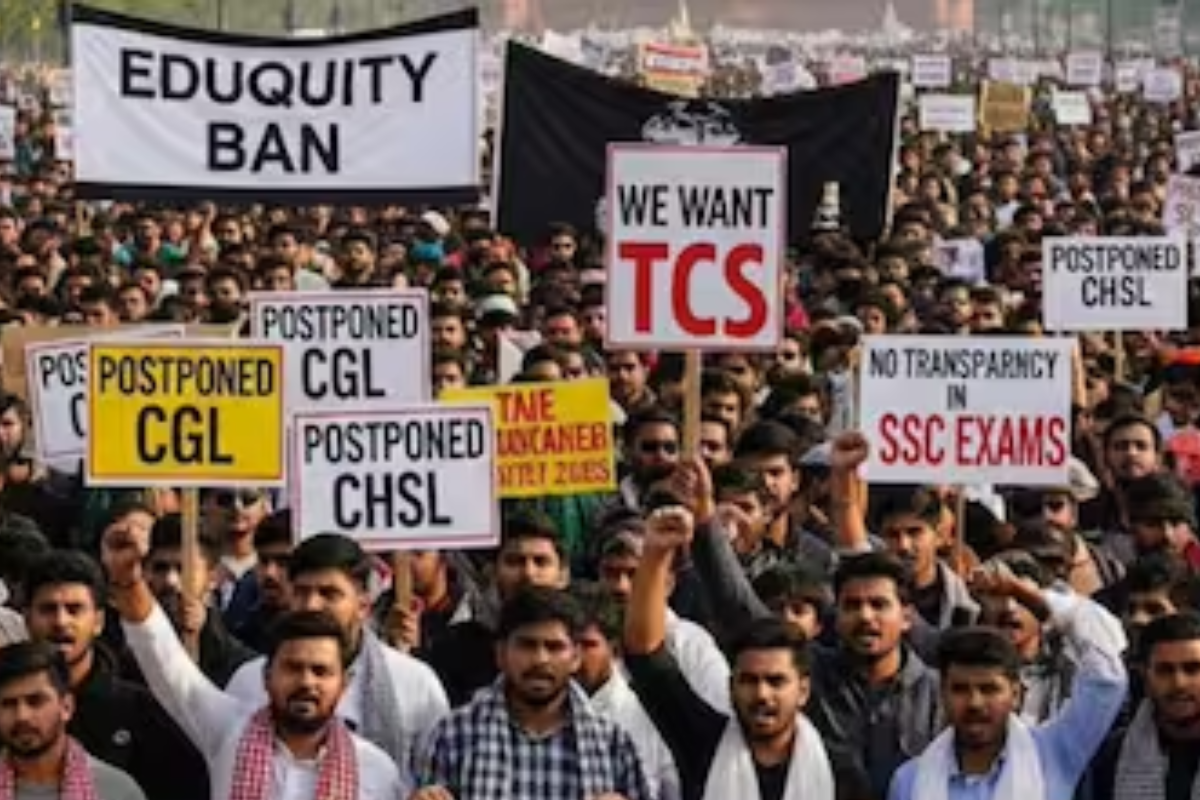Bank & NBFC Loan Recovery Harassment in India: Know Your Rights and How to Fight Back
Every year, millions of Indians who have taken loans from banks or Non-Banking Financial Companies (NBFCs) face a reality that…

SSC
The heart of the nation is witnessing a rising wave of discontent, as thousands of students and teachers gather in protest against the alleged mismanagement and corruption in the Staff Selection Commission (SSC) recruitment exams. What began as online outrage has now spilled onto the streets, with massive demonstrations being staged in the capital, highlighting long-standing grievances with the examination system.
From flawed question papers to technical glitches at exam centers, students say they are bearing the brunt of systemic failures. At the center of this growing storm is a simple demand transparency, fairness, and accountability in the recruitment process.
India, often celebrated as the land of knowledge and ancient learning, now finds itself grappling with a credibility crisis in its education and recruitment system. The SSC, a key institution responsible for recruiting candidates into various government departments and ministries, is facing serious allegations ranging from paper leaks to poor infrastructure at test centers.
Students from across the country have been sharing disturbing experiences:
These aren’t isolated incidents but a pattern, say student groups. And this pattern, they argue, is systematically eroding the trust of an entire generation in government institutions.
According to data, nearly 70% of India’s youth still rely on government jobs for employment and economic security. This makes recruitment exams like SSC not just career-defining, but life-defining for millions. The repeated irregularities in these exams do not just disrupt lives they shatter dreams.
This is not the first time the SSC has come under fire. Protests over paper leaks and delays have become a recurring feature over the past few years. Yet, this time the intensity is different. The protests have become more organized, and the anger more focused.
“We don’t want favors. We want a fair process,” says Ritu Singh, a postgraduate student from Uttar Pradesh. “Is that too much to ask in a democracy?”
Despite multiple protests and media coverage, both the government and the SSC have offered limited responses. While officials have promised “investigations” and “reviews,” no significant reforms have been implemented so far. Critics allege that bureaucratic apathy and political disinterest have allowed this mess to grow unchecked.
Worse, student groups claim that whenever a controversy erupts, it’s brushed off as a “technical error,” with no one held accountable. The exam conducting bodies continue to function without transparent audit mechanisms or external oversight.
As one protester put it: “It feels like a well-planned business. Delay the exams, cancel the papers, leak questions, make students reappear and earn from application fees every time. We are just customers in a corrupt system.”
Beyond the logistical failures and administrative chaos lies a deeper, more tragic consequence the psychological toll on students. Reports of depression, anxiety, and even suicides among aspirants have become alarmingly frequent.
When students spend years preparing, only to see their efforts wasted by systemic flaws, the despair is natural. But what’s shocking is the collective indifference to this pain.
“The system is not just failing us academically. It’s failing us as human beings,” said a protesting teacher. “We are producing a generation that believes merit has no value unless it’s backed by money, power, or political connection.”
The ongoing protest should not be viewed in isolation. It is a reflection of a deeper crisis in the public recruitment and education ecosystem. Immediate steps that must be taken include:
At its core, the SSC protest is not just about jobs or exams it’s about trust. Trust in institutions. Trust in the idea that hard work will be rewarded, not punished. If the cries of India’s youth continue to go unheard, the consequences will be far-reaching. A democracy that ignores its students today may find itself without a future tomorrow. For now, the protest continues not with violence, but with questions. And perhaps, that is the most powerful form of resistance.
Advertisement